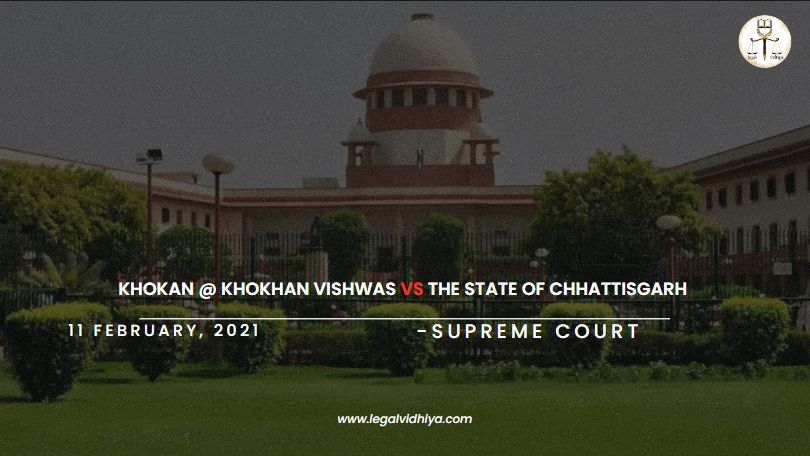
| CITATION | AIR 2021 SUPREME COURT 939, AIRONLINE 2021 SC 51 |
| DATE OF JUDGMENT | 11 February, 2021 |
| COURT | Supreme Court of India |
| APPELLANT | Khokan @ Khokhan Vishwas |
| RESPONDENT | State of Chhattisgarh |
| BENCH | Justice M.R. Shah, Justice Dhananjaya Y Chandrachud |
INTRODUCTION
The case of Khokan @ Khokhan Vishwas vs. The State of Chhattisgarh revolves around the tragic death of Manku Ram, which occurred after a physical altercation with the accused, Khokan Vishwas. This case raises significant legal questions about the classification of the crime under the Indian Penal Code (IPC), specifically whether it constitutes murder under Section 302 or culpable homicide not amounting to murder under Section 304. The altercation between the accused and the deceased, resulting from a sudden quarrel, led to severe injuries and subsequent death due to septicemia. The initial trial court convicted the accused under Section 302, IPC, which was upheld by the High Court. However, the Supreme Court had to consider whether this conviction should be altered to Section 304-I, IPC, in light of the circumstances and evidence presented.
FACTS OF THE CASE
On August 8, 2006, the deceased, Manku Ram, was at his neighbor Devan’s house when the accused, Khokan Vishwas, approached him to discuss a monetary issue. A quarrel ensued, during which Vishwas pushed Ram down and stood on his abdomen, causing internal injuries. The next day, Ram experienced severe abdominal pain and was admitted to a hospital where he eventually died on August 11, 2006. The post-mortem report indicated that the cause of death was shock resulting from septicemia caused by injuries to the small intestine.
ISSUES RAISED
- Whether the actions of the accused amounted to murder under Section 302, IPC.
- Whether the circumstances of the case could warrant a conviction under Section 304-I, IPC, instead of Section 302, IPC.
CONTENTIONS OF APPELLANT
- The incident resulted from a sudden quarrel without premeditation.
- There was no intention to cause death or grievous bodily harm.
- The delay in medical treatment contributed to the death.
- The case falls under Exception 4 to Section 300, IPC, and should be considered under Section 304-I, IPC.
- The appellant had already undergone 14.5 years of imprisonment.
CONTENTIONS OF RESPONDENT
- The deceased died within three days of the incident due to injuries inflicted by the accused.
- The medical evidence showed the injuries were sufficient to cause death in the ordinary course of nature.
- The trial court rightly convicted the accused under Section 302, IPC.
- The case did not fall under Exception 4 to Section 300, IPC, as there was sufficient evidence of intent to cause grievous harm.
JUDGEMENT
The Supreme Court considered the sudden nature of the quarrel and the lack of premeditation. It observed that the accused did not intend to cause death or such bodily injury as would likely cause death. The Court concluded that the case fell under Exception 4 to Section 300, IPC, which deals with acts committed in a sudden quarrel without premeditation. Consequently, the Court altered the conviction from Section 302, IPC, to Section 304-I, IPC, and sentenced the appellant to the period of 14.5 years already undergone, considering the long duration of imprisonment already served.
ANALYSIS
The judgment reflects a nuanced understanding of the circumstances leading to the offense. The Supreme Court’s decision to reclassify the offense from murder to culpable homicide not amounting to murder underscores the importance of intent and the context of the altercation. The Court meticulously evaluated the evidence, particularly the medical reports and the timeline of events, to determine that the accused acted in the heat of the moment without a preconceived plan to kill. This analysis aligns with the principles of justice, ensuring that the punishment fits both the crime and the criminal’s intent and state of mind at the time of the incident.
CONCLUSION
The case of Khokan @ Khokhan Vishwas vs. The State of Chhattisgarh highlights the complexity of criminal law, particularly in distinguishing between various degrees of culpable homicide. The Supreme Court’s decision to alter the conviction to Section 304-I, IPC, demonstrates the judiciary’s commitment to delivering justice based on a thorough examination of facts and circumstances. This case serves as a precedent for understanding how sudden quarrels and the absence of premeditation can influence the legal classification of an offense and the corresponding punishment.
REFERENCES
This Article is written by Avani Kanswa student of Institute of Law, Nirma University, Ahmedabad; Intern at Legal Vidhiya.
Disclaimer: The materials provided herein are intended solely for informational purposes. Accessing or using the site or the materials does not establish an attorney-client relationship. The information presented on this site is not to be construed as legal or professional advice, and it should not be relied upon for such purposes or used as a substitute for advice from a licensed attorney in your state. Additionally, the viewpoint presented by the author is of a personal nature.




0 Comments